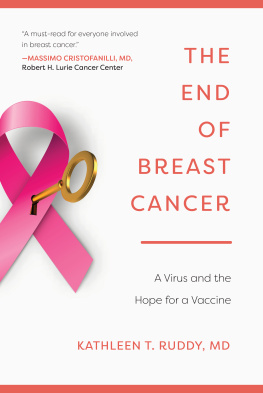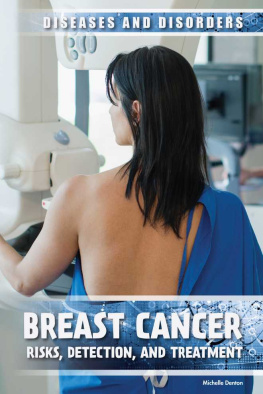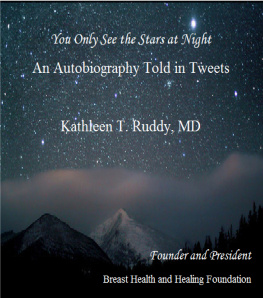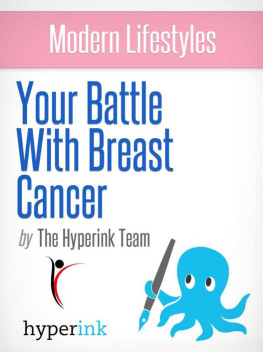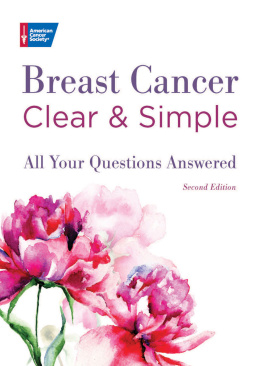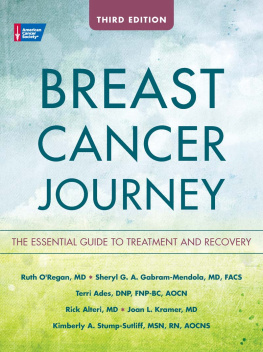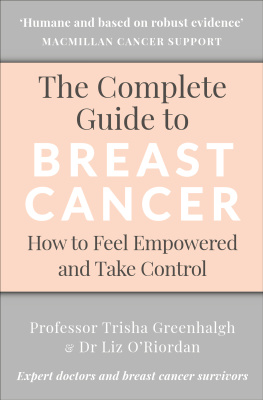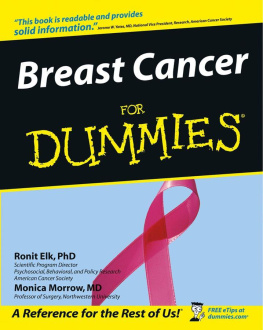W HAT THE E XPERTS A RE S AYING
This is an energetically written landmark book about the virus that causes breast cancer in mice and may very well do the same in women. Ruddy has given us an extraordinary glimpse into the history of this research that will, no doubt, change the world. We should be grateful to her for it is a noble achievement whose time has come.
Christine Chroner, MD, author of Waking the Warrior Goddess
Dr. Ruddy is a talented and compassionate clinician with an inquisitive mind who is not satisfied by simply providing excellent care to her cancer patients, but who also wants to find a more definitive solution for it. Her passionate quest for a cause has led her to uncover the hidden truths about cancer research, including important discoveries which were not made public and therefore did not impact the natural history of the disease, simply because they conflicted with the mainstream research agenda. Her avid search has important findings regarding the role of viruses in breast cancer, and she provides an informative summary presented with intelligence and passion, along with a balanced presentation of the facts like a true historian. From Loeb and Lanthrop, with their initial observational studies with mice, to Bittner, Andervont, Huebner, and more recently Baker and Holland. The work of these researchers argues for more funding dedicated to investigating the relationship between viruses and cancer. Maybe the availability of more sophisticated diagnostic technologies and increased awareness of the role of the microbiome in human health finally will shine light on this topic and allow us to find answers to the many questions these scientists have raised over the years. Women with breast cancer deserve to know if there will ever be a preventive vaccine. Dr. Ruddys book involves the reader with its accessible language and passionate narrative, showing how profoundly she cares about her patients. A clinician, a woman, and a scientist looking for clues left over more than a century of research, Dr. Ruddys book is a must-read for everyone involved in breast cancer.
Massimo Cristofanilli, MD, internationally renowned authority on inflammatory breast cancer at Robert H. Lurie Cancer Center, Northwestern University, and author of Nobody Is Listening: Stories of Inflammatory Breast Cancer
We are deeply engrossed in the research that Ive pursued for twenty years, exploring a virus in human breast cancer that is a kissing cousin of the mouse mammary tumor virus [MMTV], the causative agent for breast cancer in mice. Forty percent of American women who present with breast cancer have this virus in their tumor, but not in the normal tissue of the same breast, which thus excludes genetic inheritance. It is acquired. We are working hard to fulfill the criteria that will prove the virus is indeed the cause of these breast cancers. It keeps me busy and out of trouble.
James F. Holland, MD, distinguished professor of neoplastic diseases, Icahn School of Medicine, Mount Sinai, New York
In due course, one could envision, as the ultimate demonstration of a causative link, a vaccination program in unexposed individuals or prepubescent girls that reduced breast cancer incidence.
John R. Mackey, MD, Cross Cancer Institute, University of Alberta, Alberta, Canada
We see a need for a consistent protocol for the evaluation of IBC [inflammatory breast cancer] clusters focusing on the laboratory investigation of environmental triggers, primarily infectious agents and chemical carcinogens.
Paul Levine, MD, The George Washington University School of Public Health and Health Services, Washington, DC
MMTV is present in human saliva and salivary glands. These findings confirm the presence of MMTV in humans, strongly suggest saliva as route in interhuman infection, and support the hypothesis of a viral origin for human breast carcinoma.
Generoso Bevilacqua, MD, Pisa University Hospital, Pisa, Italy
A clear gradient of samples positive for MMTV-like sequences with increasing severity of breast cancer has been demonstrated.
Caroline Ford, PhD, Prince of Wales Hospital, New South Wales, Australia
Gestational breast cancers, by definition, are associated with major hormonal changes and hormone responsive elements present in the LTR of HMTV, together suggest a molecular mechanism to explain virus association with hormonally responding tissues.
Beatriz Pogo, MD, professor of Medicine and Virology, Mount Sinai School of Medicine, New York, New York
This needs to be in TED talks!
Cindy Sullivan, breast cancer survivor and author of the book Hope, Inc.
What we have learned about HIV can be applied to isolate the elusive [human equivalent of] MMTV.
Luc Montagnier, MD, the Pasteur Institute, Paris, France
Could a virus be the causative agent for breast cancer, similar to HPV and cervical cancer? In The End of Breast Cancer: A Virus and the Hope for a Vaccine , a strong appeal is made for people to recognize a true opportunity to advance the fight against breast cancer. The author, Dr. Kathleen Ruddy, is easily the most persistent and passionate advocate for the scientific world to pay attention to the mammary tumor virus (MTV) as a causative agent for at least some breast cancer. A woman is diagnosed with breast cancer every 20 seconds somewhere in the world, and a woman dies every minute somewhere in the world. It would seem that the real possibility that at least 25 percent of breast cancer might be caused by a virus would have the scientific world excited, and that organizations like the World Health Organization (WHO) would be working at breakneck speed to unravel the mystery of MTV and its association with breast cancer. In this book, Dr. Ruddy has presented the latest evidence that MTV is linked to breast cancer in mice and that MTV has been found in large numbers of persons with breast cancer. And I appeal to the WHO, the National Institutes of Health of the United States, public health agencies around the world, ministers of health, and the scientific community to give consideration to the genuine possibility that the virus is a causative agent of breast cancer in women, at least some of the time. Cancer nongovernmental organizations must not let this opportunity slip. If we can establish the association between breast cancer and MTV, it would go a far way in developing a vaccine and a treatment and in prevention of a significant proportion of breast cancer. For this reason alone this book is a welcome new addition in the fight against breast cancer.
Leslie Ramsammy, PhD, former minister of health of Guyana (200112) and former president of the World Health Assembly (2008)
Copyright 2015, 2017 by Kathleen T. Ruddy
Previously published as Of Mice and Women:Unraveling the Mystery of the Breast Cancer Virus
All rights reserved. No part of this book may be reproduced in any manner without the express written consent of the publisher, except in the case of brief excerpts in critical reviews or articles. All inquiries should be addressed to Skyhorse Publishing, 307 West 36th Street, 11th Floor, New York, NY 10018.
Skyhorse Publishing books may be purchased in bulk at special discounts for sales promotion, corporate gifts, fund-raising, or educational purposes. Special editions can also be created to specifications. For details, contact the Special Sales Department, Skyhorse Publishing, 307 West 36th Street, 11th Floor, New York, NY 10018 or .
Skyhorse and Skyhorse Publishing are registered trademarks of Skyhorse Publishing, Inc., a Delaware corporation.
Next page
